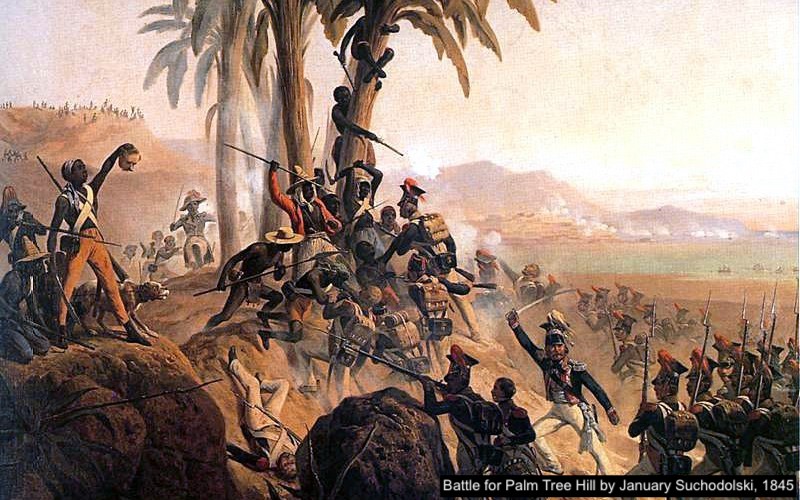Haitian Revolution
Episode #3 of the course Revolutions that changed the world by James Wareing
After the well-known revolutions of our first two lessons, we will learn about a less-covered but no less significant one in Haiti. In terms of symbolic significance, few revolutions are as important as the Haitian Revolution from 1791-1803. Haiti at the time was a colony of France and dominated by slaves and the slave trade; around 500,000 were living under slavery, many imported from Africa. Ironically, it was the ideals of the French Revolution, the concepts of individual freedom and universal citizenship, that would be drawn on to overthrow French rule.
What Caused the Revolution?
That slavery could continue in the Enlightened era of individualism and liberty was a damning indictment on the attitude of the bourgeoise who benefited from it. A French delegate by the name of Barnave described slavery as “absurd, but it is established and one cannot handle it roughly without unloosing the greatest disorder. This regime is oppressive, but it gives livelihood to several million Frenchmen. This regime is barbarous but a still greater barbarism will be the result if you interfere with it without the necessary knowledge.” Slavery apparently could not be done without, and so a blind eye would be turned to its immorality.
Haiti had everything that colonial powers wanted from a colony. It was rich in natural resources, providing sugar, coffee, cotton, and many other resources that could be obtained by the French from slave labor and then transported back to France and the rest of Europe.
Main Events
The slaves were united by a common feeling of violation and a right to freedom, and they banded together, with many fleeing to the mountains to organize a revolt. Initially, free men of color were willing to negotiate a partial abolition of slavery with the French, or slavery under better terms. Free men of color had limited rights in Haiti: They were allowed to own land and even a few slaves. Unsurprisingly, their demands and apparent acquiescence with the French were not supported by the slaves themselves.
A former slave, Toussaint L’Ouverture, began to lead a trained army of slaves. Unlike fellow freed men of color. he supported equality and the absolute abolition of slavery. The slaves gradually began to control more of the island, receiving help from the Spanish, who wanted to undermine French power in the Caribbean. The slaves vastly outnumbered the white bourgeoise on the island, who only numbered around 40,000. However, the white population had the advantage of support from France. Despite the efforts of the French and the British to quell the revolution, the slaves conquered Haiti and the neighboring Spanish colony, now the Dominican Republic.
L’Ouverture became the leader of Haiti, with the consent of the French governor in 1796, but while slavery had been abolished, they were not free from French power. Napoleon made one last effort to recover the former French colony and sent a force that captured L’Ouverture, who was taken back to France where he was imprisoned and died. However, despite the loss of their leader, the slaves were victorious once again, under the leadership of Jean-Jacques Dessalines. On January 1, 1804, the Republic of Haiti was declared.
What Happened Next?
While Haiti achieved freedom from France and slavery was abolished, a large part of its infrastructure was destroyed. The economy was also crippled by payments to France for the privilege of diplomatic recognition. Many European powers, themselves owners of colonies around the world, cut ties with Haiti, not wanting to be linked with a Republic that could inspire revolts in their own colonies. This left Haiti with a mounting debt that was compounded by endemic corruption, but nevertheless, they were free from the horrors of slavery.
How Is It Viewed Today?
Despite the significance of the events of the Haitian Revolution, its coverage today belies its importance. This could be because it is overshadowed by the French and American Revolutions of the same period or potentially because of Haiti’s lack of standing in the modern world. In Haiti, January 1st is a national holiday that commemorates the country’s independence.
Tomorrow, we shall fast forward to the 20th century, to the Russian Revolution, which was sparked by a far different set of ideals than the Haitian Revolution.
Recommended book
Sapiens: A Brief History of Humankind by Yuval Noah Harari
Share with friends

